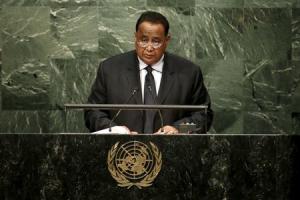Date: Sat, 3 Oct 2015 12:35:01 +0200
By Hugh Bronstein
UNITED NATIONS (Reuters) - Sudan's Foreign Minister Ibrahim Ghandour on Friday used the annual gathering of the 193 members of the United Nations to rail against the International Criminal Court (ICC), which he said has become a political tool to target African leaders.
The Hague-based ICC has accused Sudan's President Omar Hassan al-Bashir of genocide and crimes against humanity in his campaign to crush a revolt in Sudan's western Darfur region. The Darfur conflict began in 2003 when mainly non-Arab tribes took up arms against the Arab-led government in Khartoum.
In a speech to the U.N. General Assembly, Ghandour said "the relationship between the Security Council and the International Criminal Court ... has shown again and again that the scourge of politicization has turned it (the ICC) into a tool for targeting African leaders."
Others indicted by the ICC include Laurent Gbagbo, former president of the Republic of Cote d'Ivoire, and Muammar Gaddafi, the late leader of Libya.
Ghandour went on to call for "the implementation of a structural reform process of the United Nations and the Security Council, in conformity with the principal of fair and equitable representation of all countries."
"The current international system ... can no longer cope with the developments and major transformations occurring worldwide," Ghandour said.
He did not specifically mention the 2009 indictment of Bashir. He said Sudan had made "commendable achievements" in human rights, citing the growing role of women in politics.
But Human Rights Watch said last month that a government militia in Darfur carried out killings and mass rapes of civilians over the past year and a half.
The massacres in Darfur of a decade ago have eased, but the insurgency continues and Khartoum has sharply escalated the conflict over the past year, U.N. officials and human rights groups say.
Members of the ICC are obliged to act on arrest warrants, but Bashir, who rejects the court's authority, has managed to
travel in Africa, the Middle East and beyond.
A month ago Chinese President Xi Jinping welcomed the Sudanese president in China as an "old friend". Beijing, like Washington, is not a member of the ICC.
Bashir fled South Africa in June after a court ruled he should be banned from leaving pending the outcome of a hearing on his possible arrest. Pretoria disregarded the ruling.
Originally Khartoum had said Bashir would travel to New York this year's General Assembly session to attend a debate on global anti-poverty goals but he did not attempt to travel to the United States.
(Editing by Louis Charbonneau and David Gregorio)
